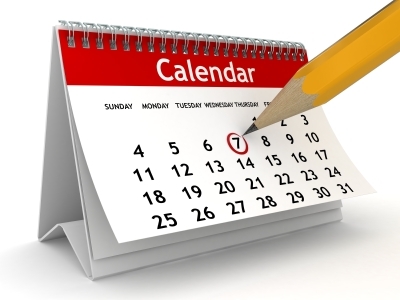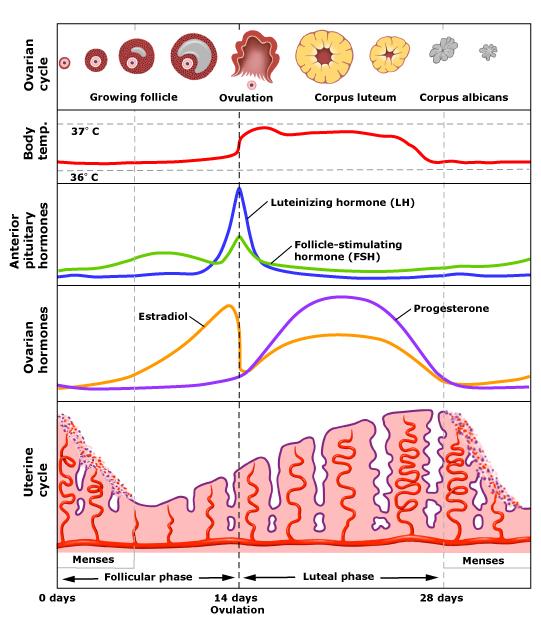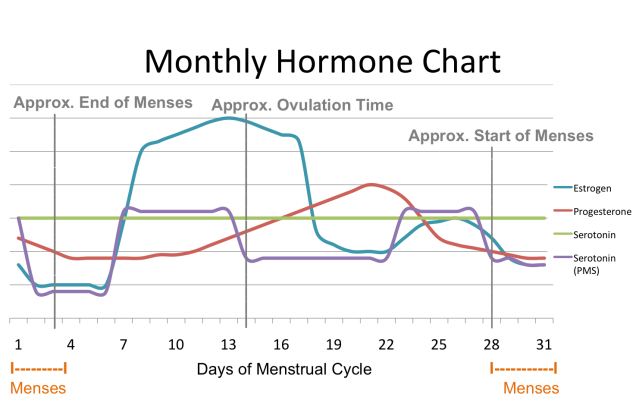We’ve talked on the blog recently about the importance of tracking your period and what information that can lead you to. You can really learn a lot about your body when you start to pay attention to it. That’s why tracking your period can really help you understand your cycle and what is normal so you know when there are red flags you need to watch out for.
But the real question is HOW to track your period? There are dozens upon dozens of apps that will track your period for you, and tell you what to expect with each period. But what app is the best and how do they differ? That’s something I want to tackle in 2018. So I’m testing out a few different period tracking apps so you don’t have to and so you can find the one that works the best for you!
This week, we’re going to talk about one of the more popular period tracking apps, or at least one that I hear about all the time: Clue! (This is not a sponsored segment on my blog, and all these opinions are completely of my own).
Clue overview
 Clue is a cleverly named tool that lets you clue in on your period. It tracks your flow’s length, amount, and symptoms easily for you in one little app! You can customize it to track the things you want to track such as flow, cravings, pain, emotions, sleep, and a lot of other things!
Clue is a cleverly named tool that lets you clue in on your period. It tracks your flow’s length, amount, and symptoms easily for you in one little app! You can customize it to track the things you want to track such as flow, cravings, pain, emotions, sleep, and a lot of other things!
The interface of this app is very easy to use and simple to navigate, making tracking your period a simple task instead of a chore. It will even remind you when your period is coming up so you’ll be prepared.
What it tracks
Clue will track a lot of different things for you. First of all, it will track how long your average period is and how long the average length between your periods is. So, the more you use the app, the more data it will collect and it will be able to tell you when your period is about to start, very accurately by the way, and how long it is going to last for.
It will also calculate your fertility window and tell you when you are most fertile. This is great if you are trying to get pregnant and need to plan! It’s also great even if you aren’t trying to get pregnant because some women still have period symptoms like pain or spotting during this time of the cycle! Clue helps you track whether that is normal since you can go back and look month to month to see what each cycle looked like.
Clue also tracks your collection method (period, tampon, other), your cravings, digestion, fluid, hair, pain, skin, temperature, and weight. Along with emotions, energy, motivation, sleep, social interactions. You can also track activities such as exercise and sex along with any medications you are on such as the pill, IUDs, and of course whatever you take for period cramps (you can track those too!). And all of these tracking features are customizable, so if you don’t feel like you need to track one, you can take it out of your daily tracking options!
What I like about clue:
 I love how easy clue is to use! As soon as I open the app the first thing that pops up is the icon to enter today’s data. I don’t have to scroll through a calendar or through any complicated pages to enter data. I just hit the big “Today” button and I have all my tracking options right there! It also makes tracking how heavy my flow is super easy giving me “light” “normal” “heavy” and of course “Spotting” options. It also makes seeing my period overview very easy. It’s all viewable from the homepage, I can see how long my period is going to last, where I am on that cycle, and what comes next so I always know what to expect. And if I don’t want to read it there, I just have to switch over to the Calendar view, which is also very easy to read and use.
I love how easy clue is to use! As soon as I open the app the first thing that pops up is the icon to enter today’s data. I don’t have to scroll through a calendar or through any complicated pages to enter data. I just hit the big “Today” button and I have all my tracking options right there! It also makes tracking how heavy my flow is super easy giving me “light” “normal” “heavy” and of course “Spotting” options. It also makes seeing my period overview very easy. It’s all viewable from the homepage, I can see how long my period is going to last, where I am on that cycle, and what comes next so I always know what to expect. And if I don’t want to read it there, I just have to switch over to the Calendar view, which is also very easy to read and use.
 I love that I can so easily see my fertility window and can track all the same things throughout the entire month. Seeing when I am spotting during this time has become extremely important to me and that’s very easy to read whether from the homepage or from the calendar. Learning this about my period has been detrimental to me learning about my flow and my body!
I love that I can so easily see my fertility window and can track all the same things throughout the entire month. Seeing when I am spotting during this time has become extremely important to me and that’s very easy to read whether from the homepage or from the calendar. Learning this about my period has been detrimental to me learning about my flow and my body!
It’s also very discrete on your phone. The icon isn’t obvious it’s about your period and neither is the name. You can also set a lock on it through the app so only you can open it! That way no prying eyes have to know anything about your period that you don’t want them to.
You can also add someone else’s cycle to your tracking options, or you can invite someone to view yours if you are managing different people’s cycles. So if you’re a parent and want to make sure that your daughter is regular, you can share the app together!
I also like that clue has a lot of information for you to read throughout the app. It gives you info on what is normal during a period, why you should track certain things, and places to get more information. It’s very helpful if you are first starting out your period or first starting out with tracking!
What I don’t like about clue:
The things I don’t like about clue are really nit picky because overall I have found it a very useful tool in understanding myself.
 The biggest downfall I find with clue is that although you can track a lot of different things, I find that the more you track, the harder it is to keep track of WHAT actually happened easily. For example all the ailments, i.e. bloating, cramping, fatigue etc. go under the blue category. So when you track them, they simply come up with a blue square on your calendar. So if you are tracking more than one ailment, you have to many little blue squares and can’t tell which is which until you click each individual day. It’s certainly not the end of the world and usually I only track my cramps since that’s my biggest ailment. I like to just be able to look at my period on a calendar and know exactly what happened on what day very easily.
The biggest downfall I find with clue is that although you can track a lot of different things, I find that the more you track, the harder it is to keep track of WHAT actually happened easily. For example all the ailments, i.e. bloating, cramping, fatigue etc. go under the blue category. So when you track them, they simply come up with a blue square on your calendar. So if you are tracking more than one ailment, you have to many little blue squares and can’t tell which is which until you click each individual day. It’s certainly not the end of the world and usually I only track my cramps since that’s my biggest ailment. I like to just be able to look at my period on a calendar and know exactly what happened on what day very easily.
 Similarly, I find the analyzer on this app a little useless. It takes a lot of getting used to in order to understand how to read it and what it all means. It’s not in graphs or anything like that, so it’s an adjustment from what other apps offer. That being said, it’s not the worst thing in the world, and I personally find I use the calendar to asses more than anything else, but I would personally prefer graphs or charts!
Similarly, I find the analyzer on this app a little useless. It takes a lot of getting used to in order to understand how to read it and what it all means. It’s not in graphs or anything like that, so it’s an adjustment from what other apps offer. That being said, it’s not the worst thing in the world, and I personally find I use the calendar to asses more than anything else, but I would personally prefer graphs or charts!
I love that this app easily tracks how heavy a flow is and that that is easy to read on the calendar (Based on how much red there is), but I wished this app (or any app really) calculated how much blood was estimated to be lost during a period. Because sometimes people have heavy flows and sometimes people have EXTREMELY heavy days. I just wish there was a more overall way to judge just how much blood (estimated) was shed.
Overall, I give Clue an 8.5/10. I really like this app and plan to continue to use it for the long run. It has changed the way I view my period and made me very aware of what is happening with my own body!
Do you use Clue? What do you like about it and what do you think could be changed? Let me know in the comments below. Or let me know if you use a different period tracking app. I would love to give it a try as well! Let me know!
Until next time,
Kat
*All photos for this blog were found via google images and most of which belong to CLUE*
 You’ve probably heard it from your doctor every time you’ve gone it for a checkup: “When was your last period?” And some of us have had to scour the backs of our minds trying to remember exactly what day our last period actually was, only to result in a lecture from the doc about how we should be tracking our period every, single month.
You’ve probably heard it from your doctor every time you’ve gone it for a checkup: “When was your last period?” And some of us have had to scour the backs of our minds trying to remember exactly what day our last period actually was, only to result in a lecture from the doc about how we should be tracking our period every, single month. What was interesting about the conversation with my mother was when she told me that when she was my age she used to experience cold and flu symptoms every time she was on her period. I had never heard anything like that before. None of my friends had ever mentioned anything like this before when we talked about our periods, so it seemed very odd to me.
What was interesting about the conversation with my mother was when she told me that when she was my age she used to experience cold and flu symptoms every time she was on her period. I had never heard anything like that before. None of my friends had ever mentioned anything like this before when we talked about our periods, so it seemed very odd to me.

 You can almost always tell when it’s coming. Not only can you probably schedule it, but you can always feel the differences in your body. The bloating comes along with the pains and not to mention that sudden craving for carbs and sugar, especially chocolate. And then you’re stuck with that feeling for an entire week. You feel like you could eat a chocolate bar or two everyday when you’re on your period, but the question is why? Why do we feel this way when we’re menstruating? Is there some hormone telling us that we should be eating chocolate? Is there some scientific reasoning that says chocolate makes us feel less painful? What’s going on here?
You can almost always tell when it’s coming. Not only can you probably schedule it, but you can always feel the differences in your body. The bloating comes along with the pains and not to mention that sudden craving for carbs and sugar, especially chocolate. And then you’re stuck with that feeling for an entire week. You feel like you could eat a chocolate bar or two everyday when you’re on your period, but the question is why? Why do we feel this way when we’re menstruating? Is there some hormone telling us that we should be eating chocolate? Is there some scientific reasoning that says chocolate makes us feel less painful? What’s going on here? Stage 3 is the menstrual phase in which the dead tissue of the uterus causes the lining of the uterus to shed. This is when bleeding takes place for 4-7 days. During this time, estrogen and progesterone levels are still low.
Stage 3 is the menstrual phase in which the dead tissue of the uterus causes the lining of the uterus to shed. This is when bleeding takes place for 4-7 days. During this time, estrogen and progesterone levels are still low.